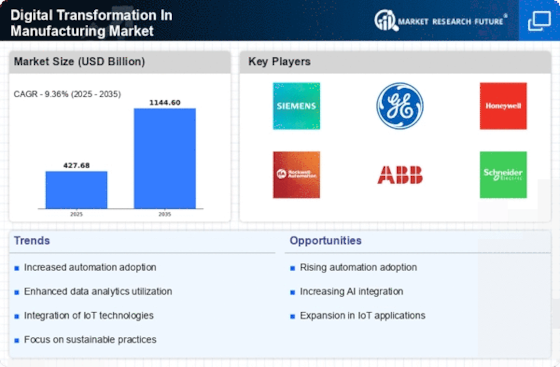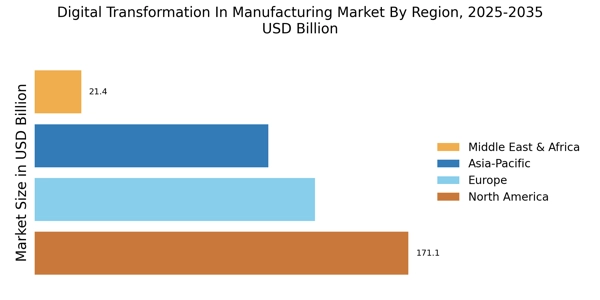Sustainability Initiatives
Sustainability initiatives are becoming a crucial driver in the Digital Transformation In Manufacturing Market. Manufacturers are increasingly pressured to adopt environmentally friendly practices, which often require the integration of digital solutions. For example, the use of IoT devices can optimize energy consumption, leading to a reduction in carbon emissions. Reports indicate that companies focusing on sustainability can enhance their market share by up to 15%. As regulatory frameworks tighten and consumer awareness grows, the push for sustainable manufacturing practices will likely accelerate digital transformation efforts.
Workforce Skill Development
Workforce skill development is increasingly recognized as a vital driver in the Digital Transformation In Manufacturing Market. As digital technologies evolve, there is a pressing need for skilled workers who can operate and maintain these systems. Manufacturers are investing in training programs to equip their workforce with the necessary skills, which can lead to a 30% increase in productivity. Moreover, a well-trained workforce is essential for maximizing the benefits of digital transformation. As the industry continues to evolve, the focus on workforce development will likely remain a key factor in driving digital initiatives.
Enhanced Supply Chain Visibility
Enhanced supply chain visibility is a significant driver in the Digital Transformation In Manufacturing Market. The ability to track and manage supply chain operations in real-time is essential for manufacturers aiming to improve efficiency and reduce costs. Technologies such as blockchain and IoT provide transparency and traceability, which can lead to a 20% reduction in supply chain disruptions. As manufacturers seek to optimize their operations and respond swiftly to market changes, the demand for enhanced supply chain visibility will likely propel further digital transformation initiatives.
Growing Demand for Customization
The growing demand for product customization is reshaping the Digital Transformation In Manufacturing Market. Consumers increasingly prefer personalized products, prompting manufacturers to adopt flexible production systems. This shift necessitates the use of digital technologies that enable rapid design changes and efficient production processes. According to recent data, companies that implement digital transformation strategies can achieve a 25% increase in customer satisfaction. As manufacturers strive to meet these evolving consumer preferences, the emphasis on customization will likely drive further investments in digital technologies.
Integration of Advanced Technologies
The integration of advanced technologies such as artificial intelligence, machine learning, and robotics is a primary driver in the Digital Transformation In Manufacturing Market. These technologies enhance operational efficiency and reduce production costs. For instance, AI-driven predictive maintenance can decrease downtime by up to 30%, thereby improving productivity. Furthermore, the implementation of robotics in manufacturing processes has been shown to increase output by approximately 20%. As manufacturers seek to remain competitive, the adoption of these technologies is likely to accelerate, leading to a more agile and responsive manufacturing environment.

















